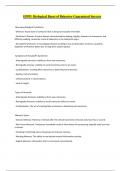Exam (elaborations)
EPPP: Biological Bases of Behavior Guaranteed Success
- Course
- Institution
EPPP: Biological Bases of Behavior Guaranteed Success Neuropsychological Conditions: - Delirium: Acute state of confusion that is abrupt and usually reversible. - Parkinson's Disease: A motor disease characterized by shaking, rigidity, slowness of movement, and difficulty walking, caused by a l...
[Show more]



